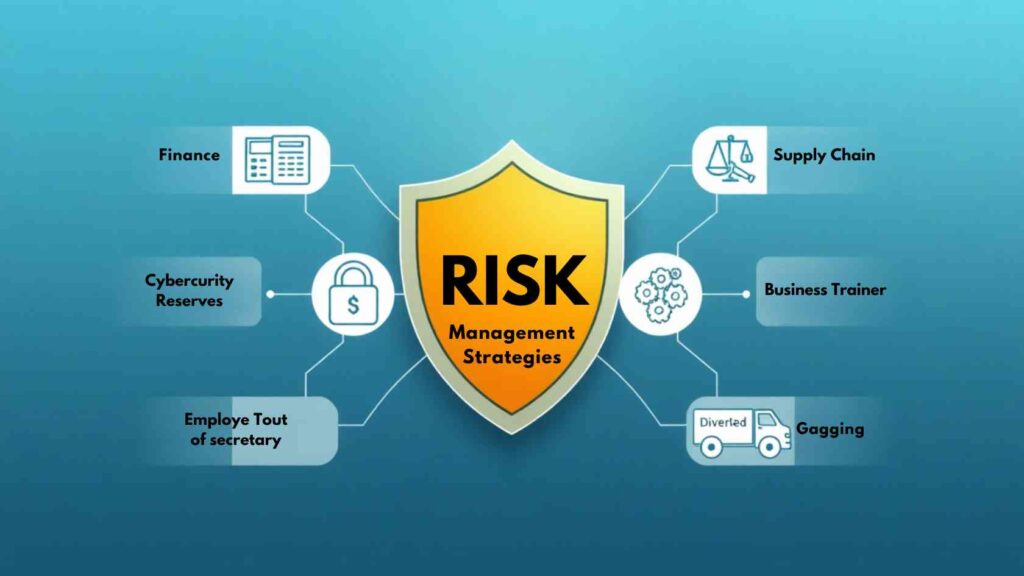Running a growing business feels a lot like trying to fly a plane and fix the engine at the same time. You’re bolting on extra wings, racing to meet demand, and stretching cash to its limits, all while crossing your fingers no big piece quits on you. The view from up here feels amazing, no doubt, but there are unseen bumps waiting to throw you off course if you ignore them.
Too many entrepreneurs zero in on scaling, landing customers, and chasing every new chance, then miss the quiet but critical work of shielding what they’ve built. It’s the part no one posts photos of on Instagram, but it’s the piece that lets the plane keep flying.
This article will examine several areas where businesses must be proactive, not reactive. Because the truth is, it’s not a matter of if problems arise, but when, and how ready you are when they do.
Mastering Risk Management Strategies to Safeguard Your Growing Business
Start With a Mindset Shift
Let’s face it, most small to mid-sized businesses don’t have a risk management department. And honestly, they don’t need one in the traditional sense. They need a culture where people are encouraged to spot problems early and feel responsible for addressing them.
It’s easy to assume that problems like data breaches, legal disputes, or even accidents won’t happen to your company until they do. And when they do, businesses that treat “being prepared” as a formality often find themselves scrambling.

A culture of preparedness isn’t built with a handbook; it’s built by leaders. When business owners and managers recognize risks and talk about them honestly, everyone in the company picks up on that attitude. Everyday chats, staff meetings, and even planning for a new project can become the right time to ask, “What might go wrong, and are we ready?” Those simple questions turn preparedness from a box to check into a habit everyone shares.
And yet, most businesses aren’t asking those questions. In PwC’s 2023 Global Risk Survey, less than a third of operational leaders felt confident their organizations had the right balance between growth goals and risk readiness. Even more telling, only 22% of risk executives said their views on risk appetite were fully aligned with those of their CEO and board.
Money Management
One of the fastest ways a growing business can find itself in trouble is by stretching its finances too thin. You’re investing in marketing, hiring new staff, expanding inventory, and suddenly, cash flow dries up when an unexpected disruption hits.
No one wants to hear this, but it needs to be said: growth is not an excuse to neglect financial discipline. Regular audits, building emergency cash reserves, and running “what if” scenarios are not just for big corporations. They’re the backbone of a business that plans to stick around for the long haul.
Another area often overlooked is insurance. Many businesses go with the bare minimum coverage to save money. But when something goes wrong, like a major equipment failure or a liability claim, you’ll wish you had spent that extra on a more comprehensive policy. It’s not about fear; you have to be practical.
Business Travel
Here’s a scenario that hits closer to home than people realize. One of your employees is on a business trip, driving to a client meeting, and gets into a car accident. At first glance, it might seem like a personal issue, but it quickly becomes a business problem. Is the employee okay? Who’s liable for damages? Does your company have policies in place for this? What’s your legal exposure? These questions don’t wait for you to figure them out afterward.
Many growing companies don’t think through the implications of business travel. They book flights and rental cars but don’t establish clear safety protocols. They don’t review whether their insurance fully covers incidents on the road. Worst of all, they assume legal matters will sort themselves out if an accident occurs.
That’s a costly mistake.
Every business that has employees traveling, even occasionally, needs a playbook. Employees should know exactly what steps to take in case of an accident. Beyond that, companies should have a relationship with a competent car accident lawyer who understands personal injury law and corporate liability.
Cybersecurity Isn’t Optional Anymore
While physical accidents are an obvious danger, digital threats are the silent killers of modern businesses. The global average data breach cost jumped to $4.88 million in 2024, a 10% increase from the previous year.

A single phishing email can expose sensitive client data. A malware infection can shut down your operations. And with regulations like GDPR or CCPA in play, a breach isn’t just embarrassing; it comes with hefty fines. Ransomware recovery can cost about $35,000 per incident, while phishing recovery costs around $70,000.
Unfortunately, many growing businesses treat cybersecurity as an IT problem rather than a business imperative. They think antivirus software and cloud backups are enough. Spoiler alert: they’re not.
Effective cybersecurity starts with awareness. Employees need to be trained to recognize scams and follow secure practices. Beyond that, businesses need real-time monitoring, proper encryption, secure access controls, and a documented incident response plan. When a data breach attempt happens (and it will), you don’t want to be improvising.
Think of cybersecurity like locking the doors of your office at night. It’s basic, but neglecting it can be catastrophic.
Don’t Put All Your Eggs in the Same Basket
Here’s something else many businesses learn the hard way: your suppliers’ problems can quickly become yours. Whether a vendor fails to deliver, a logistics breakdown, or geopolitical events disrupt your sourcing, supply chain issues can derail your operations without warning.
The solution is to be thoughtful about how you engage with them. Conduct due diligence before onboarding new suppliers. Diversify your supplier base so you’re not overly reliant on one source. And always, always have a backup plan.

All your contracts should also be reviewed carefully. Make sure some clauses protect you in cases of non-delivery or quality failures. Too often, businesses rush into supplier relationships during growth phases and only discover the fine print doesn’t favor them when things go south.
The Bottom Line
Being cautious doesn’t slow your growth. It’s what ensures your growth lasts. Companies that take the time to build protective measures into their operations are the ones that survive market shocks, legal challenges, and unforeseen disasters.
It’s easy to get seduced by the excitement of expansion. New customers, new markets, bigger numbers. But all of that can come crashing down if you haven’t taken the time to build a solid foundation.
The common thread here is foresight. Problems will come. The only question is: will you be ready? If you are, your business won’t just grow—it’ll endure.










